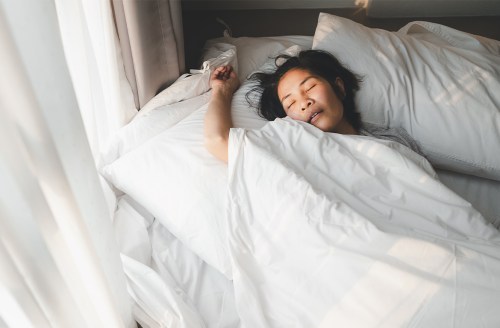Everyone has nights when they can’t sleep. Even after a long day, you get in bed just to lie awake for several hours. But Rebecca Robbins, PhD, associate scientist at Brigham and Women’s Hospital and instructor in medicine at Harvard Medical School, says that staying in bed when you can’t sleep is the worst thing you can do for your sleep cycle.
Experts in This Article
assistant professor in medicine at Harvard Medical School and associate scientist at the Brigham and Women’s Hospital
“One of the biggest mistakes that many of us make, myself included, is when we’re experiencing sleep difficulty, staying in bed and tossing and turning and thinking that if we just stay in bed a little bit longer, we’ll will ourselves to sleep,” says Dr. Robbins. But we’re actually doing the opposite. “We’re classically conditioning our brains to understand that in bed is where insomnia happens. It’s not a place where we drift off to sleep, but instead where we toss and turn.”
Most people don’t fall asleep the second their head hits the pillow, so don’t jump up if you can’t immediately fall asleep. You’ll know when it starts to feel like a lost cause.
“The well-rested person will take around 15 minutes to fall asleep. So even if you had a very healthy sleep system, it actually takes a little bit of time to fall asleep,” says Dr. Robbins. “But if you have a problematic sleep latency, right around the time when you find that voice chime in [that says] ‘Oh, not again, not again. I can’t fall asleep, not again tonight,’ that is exactly when you need to get out of bed and start the process over.”
And yes, this can be difficult especially if you just really want to cozy up and drift off. But, Dr. Robbins says it’s worth it.
“When I was little, I remember my mother saying, ‘You must stay in bed. It’s very important. Stay in bed. You’ll get some sleep. It’s better than none,'” says Dr. Robbins. “But it’s much better to reset the brain, and get out of bed. Try to do something mindless. Fold your laundry, put away your dishes, or read a couple of pages of a boring book. And then when you’re tired, come back and start the process again.” Robbins notes that it’s best to avoid screens (like computers) and strong lights, as they greatly affect your sleep.
Sometimes, the inability to fall asleep at night is tied to daytime behaviors. One of the big culprits is caffeine. “If you’re in bed and you’re not able to fall asleep because your heart is racing, blood pumping, that could be because you had too much caffeine,” she says. In that case, she says to avoid caffeine in the afternoon and limit your morning coffee to one or two cups. Another reason can be eating dinner too close to bedtime. “The digestion process takes up some energy and some time and that can keep you from falling asleep.” She also recommends refraining from high-intensity workouts right before bed.
But sometimes, behavior has nothing to do with it. Some nights, you will have a hard time falling asleep, and that’s okay.
“[Sleep difficulties] happen to all of us, and now more than ever, because we’re living in the midst of a pandemic. Our lives have been changed completely and sleep is a function of what happens during our days,” says Dr. Robbins. “Notice that that is completely normal, and take that in stride. Realize that the next day is going to get a little bit rough. You’re going to be tired, but do your best.” And remember that sleep should come much easier the following evening.
Oh hi! You look like someone who loves free workouts, discounts for cult-fave wellness brands, and exclusive Well+Good content. Sign up for Well+, our online community of wellness insiders, and unlock your rewards instantly.
Sign Up for Our Daily Newsletter
Get all the latest in wellness, trends, food, fitness, beauty, and more delivered right to your inbox.
Got it, you've been added to our email list.











